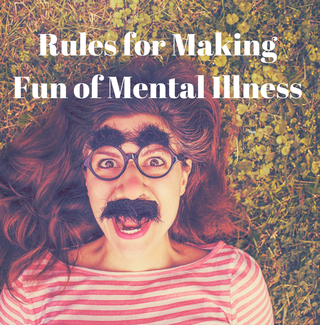Humor
Rules for Making Fun of Mental Illness
Finding "the funny" helps me put things in perspective.
Posted February 21, 2018

Wait, I know what you’re thinking: You can’t make fun of mental illness. You’re right. YOU can’t. Unless you’ve been there. Stay with me.
By far, our most effective, accessible and economical health tool is our funny bone.
I’m not a big fan of country music. Though I have been known belt out a bad rendition of Dolly’s iconic "Jolene" in the kitchen. That being said, I love country queen Reba McEntire’s quote: To succeed in life, you need three things — a wishbone, a backbone and a funny bone. I couldn’t agree more.
There are times when having a mental illness just begs for some levity. Recovering from any chronic illness, maintaining mental health, heck, just living requires some kind of sense of humor. Finding "the funny" helps me put things in perspective. Humor helps me heal from the missteps that inevitably occur when I’ve been manic or euphorically psychotic.
1. Only if You’ve Been There, Done That
If you’ve been there, done that—you can joke about it. If you haven’t, you can’t. It’s that simple. Those of us who have tread this journey have the right to make jokes about it (or NOT make jokes, for that matter). No one else does. If you’re Scottish (which I am, in part), Jewish, or from Wisconsin (of which I’m neither), you’re free to make jokes about your experiences and your clan. Otherwise, be kind. Laughing at someone else’s expense doesn’t make you funny, it makes you an ass.
2. Laugh with Us, Not at Us
It's true. I don’t want you to make fun of me for being crazy. But I do want you to laugh with me when I make jokes about it. I know it’s counterintuitive: The humor I employ is meant to get you laughing. It’s meant to help loosen you up, so you feel more comfortable talking about mental illness. The humor I use is to help highlight the erroneous stereotypes and dispel the myths about mental illness. It’s meant to provoke reflection and spark discussion.
3. Timing is Everything
They say timing is everything in comedy. It is. Using humor in the healing process, timing is everything too. Laughing prematurely when I’ve yet to process a painful event isn’t helpful. Cracking a joke before enough time has passed can make me feel worse. There are very real losses, and often tragic experiences that come along with living with a psychiatric disability or loving someone with one. Humor isn’t meant to minimize this. But humor, appropriately timed, can go a long way to help heal. Go by the old adage, “Comedy is tragedy plus time” (attributed to Mark Twain, Carol Burnett, and Steve Allen, among others). Allow yourself some time before finding the humor in your depression or psych ward stay.
But be sure to find it. Or at least look for it.
To laugh WITH me, check out my video about all the crazy labels we get called. And have a read of my 13 One-Liners About Being Crazy and even More Jokes About Mental Illness.
© Victoria Maxwell
Facebook image: Uber Images/Shutterstock


